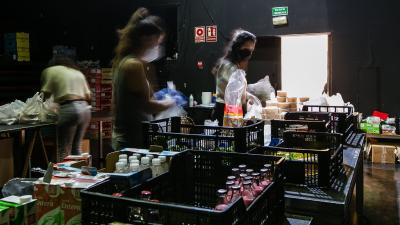A third of the world’s population would survive for less than a month with no income
This page is approximately a 3 minute read
This page was published on

The 2021 World Risk Poll findings reveal that globally, just over one in three people (34%) could cover basic needs for less than a month if they lost their income – for instance, because of a disaster – including about one in eight (12%) who could do so for less than a week.
A Resilient World? Understanding vulnerability in a changing climate
Read the reportFinancial vulnerability
Natural hazards and other shocks can have a huge financial impact on individuals as they risk losing their job or livelihood as a result. Financial security is therefore a key part of building resilience for individuals and societies. The Covid-19 pandemic provides the most obvious recent example of widespread loss of income caused by a major global shock. Within the first year, countless businesses were forced to close, causing unemployment to rise sharply in many countries1. And in a 2019 report, the International Labor Organization estimated that climate change could lead to the loss of 80 million full-time jobs by 2030, with agricultural workers the most severely affected2
- 1
The impact of COVID-19 on employment and jobs. (n.d.)…Organisation for Economic Co-operation and Development.
- 2
Working on a warmer planet: The impact of heat stress on labour productivity and decent work. (2019). International Labour Organization.
Dr. Sarah Cumbers Former Director of Evidence and Insight, Lloyd’s Register Foundation
Financial security is an important part of resilience. Resilience isn’t just about surviving when a disaster occurs, it’s about being able to rapidly return to normal life in the following weeks and months. The World Risk Poll Resilience Index provides a uniquely valuable tool for holistically assessing resilience and informing interventions.

Financial resilience by region
Financial vulnerability is highest in Southern Asia and North Africa, where around half (57% and 49%, respectively) could only cover their needs for less than a month, including around a quarter (26% and 24%, respectively), who could only do so for less than a week.
At the other end of the scale, more than half (51%) of people in both the Northern America and Australia/New Zealand regions would have the ability to cover basic needs for four months or more if their income was lost. This is closely followed by people in Northern/Western Europe (48%) and Southern Europe (42%).
The World Risk Poll provides a better understanding of those countries and regions where individual financial insecurity is likely to compound the impact of a disaster. It’s unsurprising that the findings show higher financial resilience in more economically developed countries and territories with higher average education levels and stronger infrastructure. This is likely to be one of the reasons people in these countries are more likely than those in less developed countries to say they could protect themselves and their families in the event of a disaster.
1/3 of people globally can only cover basic needs for less than 1 month if they lose all their income.
Financial resilience by demographic groups
Perceived ability to protect self and family from disasters.
52% of people globally believe they can protect themselves and their family in the event of a disaster.
Ability to cover basic needs if income was lost, by region.
If you lost all of your household income and had to survive only on your savings or things you could sell, how long would you be able to cover your basic needs?
Download the report

A Resilient World? Understanding vulnerability in a changing climate
Revealing how people worldwide feel their country’s infrastructure and government can cope in the face of disasters, the report provides global insights into how prepared and resilient individuals believe their communities, countries and institutions are. (PDF, 5.46MB)


